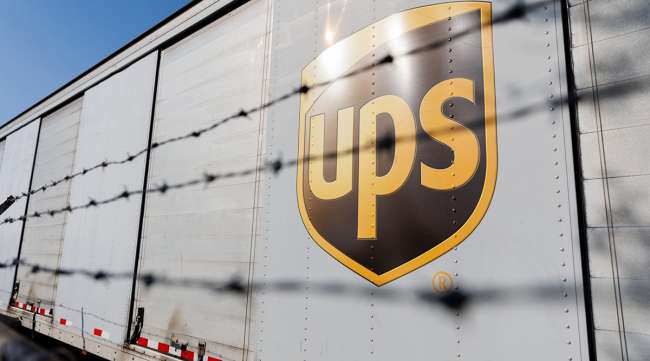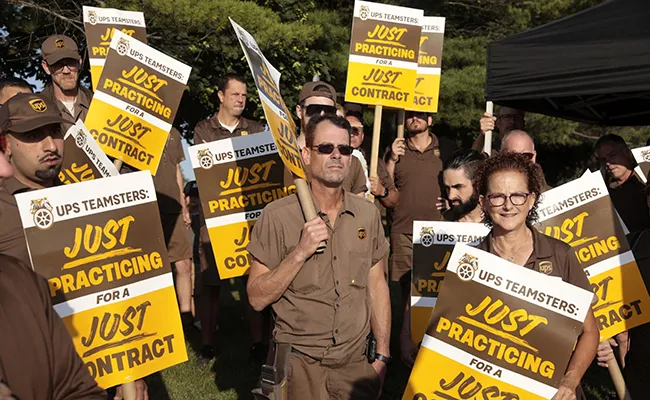Senior Reporter
UPS, Teamsters Agree to Resume Talks July 25

[Stay on top of transportation news: Get TTNews in your inbox.]
UPS Inc. and the International Brotherhood of Teamsters jointly announced July 19 that negotiations between the two sides for a new labor contract for unionized workers will resume, with the union subsequently stating talks would pick up July 25.
UPS confirmed the restart date to negotiate the “few remaining open issues” and reiterated its call for the two sides to work quickly to get a deal before the deadline.
“We started these negotiations prepared to increase the already industry-leading pay and benefits we provide our full and part-time union employees and are committed to reaching an agreement that will do just that,” UPS said in a statement.
The high-profile negotiations broke down on the morning of July 5 after several days of productive talks. Leading up to the stalemate, the two sides had come to agreement on several hot-button issues. Those included the company’s agreement to scrap a 4-year-old, two-tier pay and benefit scale for weekend delivery drivers and package handlers, removal of mandatory overtime provisions and installation of air conditioning in older delivery vehicles and in future newly purchased trucks.
“We are pleased to be back at the negotiating table next week to resolve the few remaining open issues,” the company said in a statement announcing the resumption of talks. “We are prepared to increase our industry-leading pay and benefits, but need to work quickly to finalize a fair deal that provides certainty for our customers, our employees and businesses across the country.”
The Teamsters’ leadership has been touring the country and meeting with some of the 340,000 UPS unionized drivers and workers since the talks broke down.
We are pleased to be back at the negotiating table next week to resolve the few remaining open issues. We are prepared to increase our industry-leading pay and benefits, but need to work quickly to finalize a fair deal that provides certainty for our customers, our employees and… — UPS News (@UPS_News) July 19, 2023
“The Teamsters’ agreement with UPS is the largest private-sector union contract in North America. UPS Teamsters are demanding the strongest possible contract or are prepared to strike,” the union said on July 19. Rank-and-file members voted to authorize a strike if their demands are not met by the July 31 expiration of their current contract.
Transportation stakeholders are closely watching the talks.
“This is very positive. We don’t know what the reason was for this positive development, but it’s much better than posturing and not talking to each other with the deadline looming at the end of the month,” said Paul Bingham, director of transportation consulting with S&P Global Market Intelligence. “It’s better for everyone involved if they are going to work towards a resolution of the contract — I don’t know how you can view it any other way. This is a very positive development.”

Bingham
Bingham said with the days ticking away, it’s possible both sides are feeling the pressure to reach a deal. “Until your contract is expired you’ve got time to make a deal,” he said. “Both sides are going to suffer if there is a strike and there is no revenue flowing to the company and no wages to the workers. They’re both going to lose in the end, because some shippers will shift to other carriers and not come back. And there will be other challenges to disappointing your customers, that rely on you.”
He added, “I don’t know that either hand has an upper hand, but they need to find a resolution.”
On a daily basis, UPS moves an estimated 25 million parcels, which accounts for 6% of the nation’s gross domestic product, including sectors vital to the economy that would suffer during a strike, such as health care, electronic components, apparel, and spare parts for motor vehicles, according to Michigan State University Associate Professor for Supply Chain Management Jason Miller.

UPS workers and Teamsters members practice picketing outside a UPS distribution facility in Madison Heights, Mich., July 18. (Jeff Kowalsky/Bloomberg News)
Miller added that UPS’ volume is so massive that other shipping companies, including UPS rival FedEx, DHL and other smaller carriers, do not have the capacity to manage all of the work.
UPS recently announced that in preparation for a possible strike it was beginning to train some of its employees how to operate the familiar brown trucks and deliver packages.
UPS Inc. ranks No. 1 on the Transport Topics Top 100 list of the largest for-hire carriers in North America.
Contributing: Bloomberg News
Want more news? Listen to today's daily briefing below or go here for more info:



